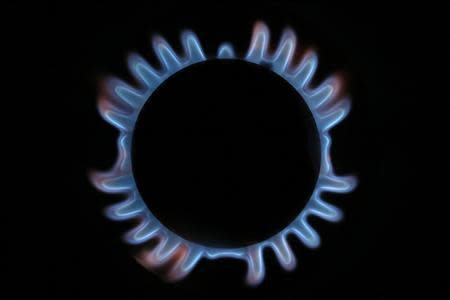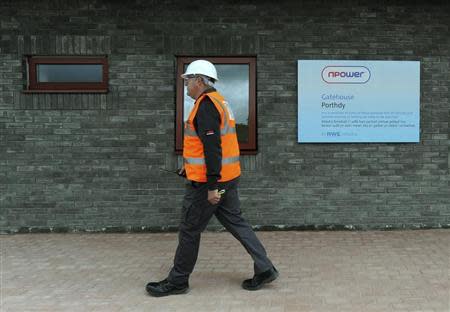British energy firms to limit price rises after tax pledge
By Kate Holton and Peter Griffiths LONDON (Reuters) - Britain's biggest energy companies agreed on Monday to limit increases to household bills, giving some relief to Prime Minister David Cameron on an issue that has angered voters and given opponents a potent line of attack before a 2015 election. Soaring energy costs have become a big political issue in Britain since Labour leader Ed Miliband said in September he would freeze consumer bills for 20 months if he wins power. In response to a pledge by the government to remove some taxes and social charges from bills, Britain's "Big Six" energy companies said they would pass on the savings and try to keep prices low until the next election. Energy Secretary Ed Davey said the changes to electricity and gas bills, which will form part of the government's twice-yearly budget update to parliament on Thursday, would save the average household 50 pounds ($81.90) each year. But Labour's Miliband said gas and electricity bills, which average over 1,200 pounds a year for each household, would still rise this winter and families would end up paying for the savings through their general tax bills. "We have been working on getting people's energy bills down since we came to power," Davey told Sky News when asked if the government had only acted on energy costs under pressure from Miliband. "Under Labour, energy bills would have been much higher than they are now." The energy companies blame the price rises on wholesale prices, the cost of the supply network, and the government's environmental and social programmes. Environmental taxes and social charges contribute nearly 10 percent to domestic energy bills. Npower, the British arm of German utility RWE, said it would now cut bills in line with the 50 pounds reduction. Npower had in October announced an average price increase of 10.4 percent - almost four times the rate of inflation - which kicked in on December 1. British Gas, owned by Centrica, said it would reduce the cost of the average dual fuel bill by 53 pounds from January 1 while SSE said it would take 50 pounds off its bills before the end of the current financial year. Scottish Power and E.ON said they would also pass on the savings while EDF Energy, which had previously announced a rise of just 3.9 percent, said it had already anticipated the government changes and would therefore not need to lower bills. They all said they would seek to freeze bills until after the next election, unless wholesale energy costs or network charges increase. The six big firms supply 98 percent of the country's homes. "SMOKE AND MIRRORS" The debate over how much Britons pay to heat and light their homes has turned into a political football, with all the main parties desperate to seize the initiative. With the economy growing again after a deep crisis, Labour has shifted its campaigning from stagnation to what it calls a cost of living crisis that it blames on an uncaring and out-of-touch coalition government. Cameron conceded in October that Miliband's price freeze idea had "struck a chord". A poll suggested it was the most popular policy of the party's autumn conference season. Miliband, whose Labour Party has around a seven-point lead over the Conservatives, said the government was using "smoke and mirrors" to disguise the fact that bills would still rise. Davey's Labour counterpart Caroline Flint said the average bill would still be an average of 70 pounds higher this winter compared to last year. Exane BNP Paribas analyst Iain Turner said the 50 pounds reduction could take some sting out of the issue although the perception was likely to remain that energy prices were high in Britain, giving Labour an ongoing line of attack. "Prices are still going up and there could still be rises to come before the election," he said. "Holding prices flat for 18 months will impact on (energy company) margins by the end of that period, it will hurt profitability." Shares in the two London-listed groups SSE and Centrica were trading slightly lower in mid morning trading. (Editing by Angus MacSwan)


